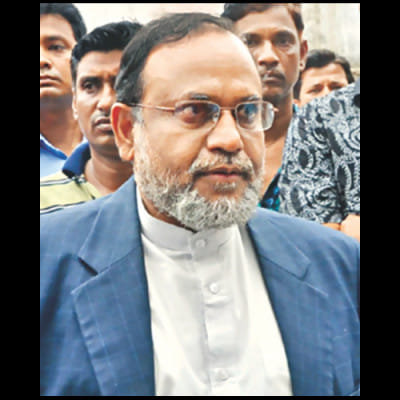Death warrant issued for Mir Quasem

The International Crimes Tribunal yesterday issued a death warrant for convicted war criminal Mir Quasem Ali hours after the Supreme Court released the full text of its verdict upholding his death penalty.
The ICT registrar's office sent the warrant to Dhaka Central Jail around 7:30pm following the tribunal's directives, Registrar Shahidul Alam Jhinuk told The Daily Star last night.
Copies of the warrant were also sent to the Dhaka district magistrate, and the home and the law ministries.
Shahidul said his office received a copy of the full verdict around 3:30pm.
Neasar Alam, jailer at Dhaka Central Jail, told this correspondent that they received the warrant at 7:50pm and “would send it to Kashimpur Jail-2 in Gazipur” where the Jamaat leader has been kept.
He, however, didn't say when the warrant would be sent there.
On November 2, 2014, the ICT-2 handed down capital punishment to 63-year-old Quasem, chief of Chittagong Al-Badr Bahini, for committing crimes against humanity during the 1971 Liberation War.
Yesterday, the SC released the full text of its March 8 verdict that upheld the death penalty of Quasem, considered by many as chief financer of the anti-liberation Jamaat-e-Islami, leaving him with the only option of seeking review of the judgment.
Talking to reporters after the verdict, Attorney General Mahbubey Alam said Quasem, a member of the Jamaat central executive council, could file review petition with the SC within 15 days of receiving a copy of the full verdict.
The scope is very limited for a convict to have an SC judgment reviewed in such a case, he said.
Meanwhile, Quasem's principal lawyer Khandker Mahbub Hossain told The Daily Star that his client would file a review petition with the SC within the deadline.
“We hope we will get justice in the review,” he said.
If Quasem's review petition is rejected, the last option for him would be to seek presidential mercy.
So far five war criminals have been executed. All of them sought review of the SC verdict in their cases but all the petitions were rejected.
Quasem is the fifth Jamaat leader to have got the death penalty for playing a notorious role in 1971.
During the Liberation War, Quasem led several Al-Badr torture camps, including the one set up at Mahamaya Dalim Hotel in Anderkilla of Chittagong, where his cohorts would torture and kill freedom fighters and pro-liberation activists captured from across the city.
The ICT-2 sentenced him to death on two charges and different jail terms on eight other charges. He later challenged the verdict at the apex court.
On March 8 this year, the SC upheld his death penalty for one charge -- the brutal torture and killing of young freedom fighter Jasim.
His conviction and punishment on six other charges were upheld by the five-member SC bench headed by Chief Justice Surendra Kumar Sinha.
The other four judges of the bench are Justice Syed Mahmud Hossain, Justice Hasan Foez Siddique, Justice Mirza Hussain Haider and Justice Mohammad Fazlur Rahman.
QUASEM A RESOURCEFUL PERSON: SC
In its full verdict, the apex court said Quasem is a very resourceful person and “is capable of engaging lobbyist firm by spending US$ 25 million to frustrate the trial of offences of crimes against humanity”.
“The fact of engaging a lobbyist firm may or may not be true, but fact remains that learned Attorney General has collected a receipt of payment of US$ 25 million from which it can be inferred that the appellant is a very resourceful person…. This is evident from the materials on record as well.”
The court said Quasem on June 19, 2012 filed a bail petition and made statements supported by documents about his financial solvency.
“The tribunal recorded an order to the effect that 'it was stated in the petition that the accused petitioner is a successful and respectable businessman of this country',” it said.
“He is the chairman and director of Keari Limited, chairman and director of Diganta Corporation Limited, founding trustee and member administration of Ibn Sina Trust, member-secretary of Islami Bank foundation, director of Ibn Sina Pharmaceutical Industries and chairman of Agro Industrial Trust, member-secretary of Fouad Al-Khateeb Charity Foundation, member of Society for International Development (SID), chairman of the association of Multipurpose Welfare Agency and vice-chairman of Industrialists and Businessmen Welfare Foundation.
“So, from the above it can be inferred that he has set up business conglomerate from which it can be inferred that he is capable of engaging lobbyist firm by spending US$ 25 million to frustrate the trial of offences of crimes against humanity,” said the court.
SC UNHAPPY WITH PROSECUTORS
In its 244-page verdict, the court expressed dissatisfaction over the performance of two prosecutors -- Sultan Mahmud Simon and Zead Al Malum, saying there was lack of coordination between the two in conducting the case with ICT-2 against Quasem.
“The mistake committed by the prosecutors in conducting the case is that both the prosecutors did not jointly conduct the case. One prosecutor examined some witnesses and other prosecutor examined some other witnesses, resulting in lack of sequence,” the verdict reads.
“Both the prosecutors together were not present in the tribunal in course of examination in-chief and cross-examination of the witnesses. Naturally they could not concentrate their minds so far as regards incriminating part of evidence.
“Besides these witnesses, the prosecution has examined P.Ws. [prosecution witness] 20, 21, 22 and 23 to prove circumstantial and documentary evidence. P.W. 24 is the investigation officer. One witness also deposed in support of different charges and under such circumstances, how could the prosecutors concentrate their minds is not clear to us,” it added.
NO LENIENCY FOR QUASEM: SC
“The accused appellant was one of the organisers of Al-Badar force at Chittagong, which was raised with the aim and object of killing the pro-liberation forces and minority community -- the force is known as 'killing squad', said the apex court.
“The accused [Quasem] not only organised the force at Chittagong, he had commanded the force and directly participated in the perpetration of most barbarous acts unknown to human civilization. He does not deserve any leniency on the question of sentence on consideration of the nature and gravity of offence.
“The tribunal awarded the sentence of death in respect of charge No 11 which according to us was 'proportionate to the gravity of the crime',” it added.

 For all latest news, follow The Daily Star's Google News channel.
For all latest news, follow The Daily Star's Google News channel. 







Comments